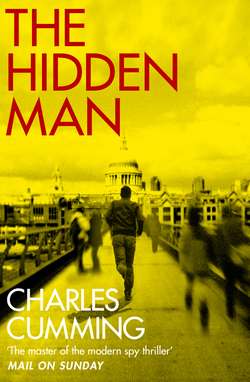Читать книгу The Hidden Man - Charles Cumming - Страница 16
9
ОглавлениеStephen Taploe moved gradually along the aisles, filling his trolley with foods. It was a nothing moment. Once a week, he ventured to the Clapham Junction branch of Asda and bought enough provisions to last him for exactly seven days. Taploe was frugal, although, as a single man earning £41,500 a year, he did not have to be. Armed with reward points and a fistful of vouchers, he would attempt to check out for less than twenty-five pounds, but it was difficult with London prices and sometimes he would treat himself to an extra bottle of mediumdry white wine, or a tub of ice cream in his favourite flavour, vanilla. Taploe lived alone and had, on average, eight meals to cater for each week: two lunches (Saturday and Sunday), as well as six evenings at home. On Thursdays he was always sure to join his colleagues at a tapas bar in Victoria that was popular with D-Branch personnel: promotion, he assumed, would come quicker if he could develop and sustain relationships with senior management outside of office hours.
The supermarket was noticeably less salubrious than the branch of Marks and Spencer’s in nearby St John’s Road, and lacked the international range and flair of products available at Sainsbury’s. Nevertheless, Taploe preferred Asda, largely because it was cheaper and closer to home. He eschewed fancy microwave meals, preferring to cook from scratch; indeed, he would derive a certain satisfaction from making a single item last for several days. He could, for example, let a medium-sized battery chicken suffice for three meals: roasted first, then curried, and finally cold. Every week he bought a packet of six Porkinson’s sausages (two meals), three fillets of salmon (one of which he would habitually freeze) and a ribeye steak with oven chips for Sunday lunch. He ignored the aisles given over to juices and did not buy food in tins. For something sweet, Taploe allowed himself ice cream, a single packet of Penguins and a punnet of Elsanta strawberries.
It was a Friday evening, the pre-weekend crowd, and thankfully there were precious few children screaming at the hips of single mothers. Week after week Taploe watched them bumping trolleys into shelves and walls, spilling bottles of Sunny Delight in egg-yolk pools on the floor. But he could move with comparative ease tonight, through fruit and veg to wines, and would be home within ten or fifteen minutes, depending on the queue at the tills.
Just before seven thirty his mobile rang.
‘Mr Taploe?’
It was Katy, a low-level researcher less than six months out of college with a degree in media studies from Exeter University. He liked the fact that she sounded nervous on the phone and made a point of calling him ‘Mr Taploe’.
‘Yes, what is it?’
‘Well, I’ve been looking into Juris Duchev as you instructed, sir, and I’ve been advised by Paul Quinn to contact you directly with some information that I think you might find of interest.’
Taploe was standing beside a bored shelf-stacker. He moved towards the tills.
‘Go on.’
‘I’ve spoken to Interpol, sir, and they suspect that Duchev has been involved in at least two recent incidents still under investigation by the relevant lawenforcement authorities in those areas. The first was in Monaco three years ago, the shooting of a French investment banker with links to the Kukushkin organization. He was shot in his car waiting at traffic lights on the lower of the connecting roads between Monaco and Nice. The second took place in a Moscow suburb back in 1995.’ Katy breathed in quickly. It sounded as though she was searching through notes. ‘Again, that was a motorcyclist with a passenger riding pillion shooting directly into a vehicle. We suspect that if there’s razborka – the Russian term for the settling of a mafia dispute – then Juris Duchev is the individual who would carry it out on the mainland on behalf of the Kukushkin syndicate.’
Taploe didn’t say ‘Thank you’ or ‘Well done’, simply: ‘Is there any record of arrest?’
‘None, sir. Not on the files. And nothing from RIA.’
‘So your point is?’
It was the bully in him, the small man.
‘Well, what we didn’t know, sir, is that Duchev has a UK right of residence. It just came up. At the moment, he can come and go as he pleases.’
Taploe reached the end of Aisle 14 and stopped.
‘I see.’ The news irritated him, though he maintained a level tone of voice. ‘Well, thank you for passing on that information. I’ll come in to see you after the weekend and we can discuss it further.’
‘Very well. Thank you, sir.’
‘And Katy?’
‘Yes, sir?’
‘I know full well what razborka is. There was no need to enlighten me.’
‘Yes, sir. Sorry, sir.’
‘Goodbye.’
As he replaced the phone in his pocket, the back wheel of Taploe’s trolley caught on a sticky ball of waxed paper. He had to bend down to free it and missed a slot in the queue. Duchev, he thought. We let men like that live here, let them enter and leave at will. The British, in the name of decency and fair play, wave their enemies through the gates without so much as a glance. Tends to make my job harder, he mused, pushing towards the tills.
